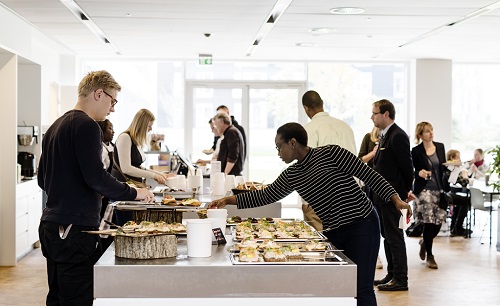Sustainable canteens at South Campus
At South Campus the canteens strive to reduce their carbon footprint. Both “Wicked Rabbit” and “HUM-kantinen” focus increasingly on providing sustainable food.
Wicked Rabbit serves vegetarian food only and on Wednesdays no meat is served in the canteens at South Campus. Canteen manager Laila Bjerregaard places the meatless days on top of the list of initiatives she is proud of. “Of course there are mixed opinions and the students and employees have to get used to the vegetarian selection. But I am incredibly proud that we are in front on sustainability.”
Gold in the ground
Laila Bjerregaard’s list also counts no single-use bottles for meetings, biodegradable and compostable containers, less beef and reuse of coffee grounds. Only 0.2 per cent of the nutritional components in the coffee is used, when you brew coffee. Normally the rest goes directly in the bin with the coffee ground. But not at South Campus – here it is picked up by Beyond Coffee and used for growing oyster mushrooms.
According to Laila Bjerregaard the canteens at South Campus is a sort of “start-up”, where possible initiatives can be tested. Because the students are concerned about climate change and sustainability, they are open for innovative ideas. “The concept we are running at South Campus can easily be applied in other canteens – if the demand is there”, Laila Bjerregaard emphasizes.

Discount if you bring your own cup
The sustainable model also contains initiatives on food waste, the amount of wrapping and organic principles. In order to reduce food waste a vegan soup is cooked from leftovers and sold on the last Thursday of the month. Left-over food from the canteen is sold in the café Mødestedet, in cooperation with Too Good to Go. The cost of disposable tableware is 2.5 kr. in order to reduce the usage. Coffee is cheaper if you bring your own cup – depending on the size of the cup. Forty percent of the food is organic and the canteens aim that all eggs and dairy is organic.
A demand for green creativity
In the future Laila Bjerregaard hopes that it will be possible to reduce the amount of meat further by introducing more meatless days: “More meatless days would allow us to ensure that the meat that is served is high quality.” It is possible that the canteen will one day be 100 % vegetarian. Laila Bjerregaard thinks that it is unlikely in the near future as there is still a high demand for fish and meat. She is sure though, that the canteen will become still more creative using vegetables in different dishes and that signposting in the future will make it easier to choose vegetarian or vegan.
